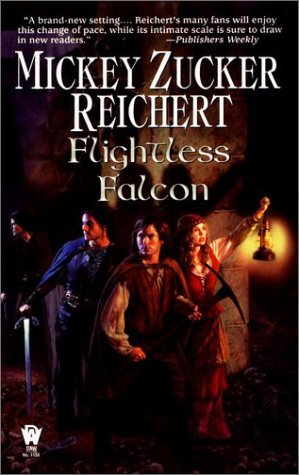(Since I want to keep this blog with some sort of momentum but have been lacking the time to do anything about it for the past few weeks, enjoy this book review from an earlier, temporary blog that I had going for a class, in which I pretended I was a dragon with a computer, edited to remove any reference to me being a dragon with a computer, as I am in actuality not one of those.)
 Flightless Falcon is a light DAW fantasy by Mickey Zucker Reichert that first came out in paperback in July of 2001. Set in your typical fantasy land – lightly coated in magic but sans any fantastical creatures such as dragons, elves, dwarves, and the like – it follows the sad, luckless exploits of an ex-miner named Tamison made useless after a cave in kills his father and brother and leaves him trapped deep in the mine for a few days.
Flightless Falcon is a light DAW fantasy by Mickey Zucker Reichert that first came out in paperback in July of 2001. Set in your typical fantasy land – lightly coated in magic but sans any fantastical creatures such as dragons, elves, dwarves, and the like – it follows the sad, luckless exploits of an ex-miner named Tamison made useless after a cave in kills his father and brother and leaves him trapped deep in the mine for a few days.
Afterwards, with a debilitating fear of both the dark and being underground, he’s unable to continue as a miner, yet too unskilled to get any other job. As such, he and his family live in dirt poverty for a decade or so until he finally decides to try stealing what they need instead of earning the money to buy it. Unfortunately he’s just as horrible at this as anything else he tries and ends up in jail for two years.
When he finally gets out, his family’s disappeared, so he adopts a stray dog and lives on the streets for a while. Then one day a guard finds him and tells him, “Hey, I know where your family is, and it’s bad, man, we should go save ’em.” So Tamison saves a fortune teller from some different guards, just for good measure, and the three of them go off to get his family back.
The plot evolves from there – I won’t go into much greater detail because I don’t want to give anything away. And while it’s an entertaining read, it does have its share of snags, though not often or strong enough to derail the overall experience. Still, might was well talk about ’em.
The majority of these moments occur due to the protagonist himself; Tamison’s constant suffering and depression and worthlessness gets a bit irritating after a while (and not a very long while). But you do end up genuinely sympathizing with him, at least for the most part – his self-pitying and constant sobbing are offset, personality-wise, by his intense love and devotion to his family’s welfare (though apparently it still isn’t strong enough for him to suck up his phobia and go back to working in the mines). The end result is a character that, while whiny enough that you want to reach into the pages and smack him, is still believable. The fact that a lot of his misfortune is brought on by bad luck and the overwhelming apathy of the world around him, instead of just his own sad uselessness, also helps save what might have been an otherwise excruciatingly sad-sack protagonist.
But ignore what Miss Reichert and the back cover of the book say – the real star of this story isn’t Tamison, the guard (Dallan), or the fortune teller (Rifkah). It’s the weasely bastard of a con man that Tamison can’t stop running into, the aptly-named Con. This guy’s selfish lack of a moral compass and unwillingness to sugarcoat anything for anyone is a breath of fresh air amidst the hopeful optimism and general boyscout do-goodery of the rest of the starring party, and his quick wit and blunt, sarcastic dialogue are at once impressive and entertaining to read in the circumstances. His back story’s also far more interesting than anything Tamison, Dallan, and Rifkah can come up with.
The story itself also grows past a simple “save some good guys from some bad guys” fetch quest to envelope a degree of political intrigue, subterfuge, loyalty dilemmas, and good ol’ fashion backstabbery. I won’t say anything more past the obvious (there’s a twist, you know there’s gonna be a twist, there’s always a twist) other than to say that the generic good-guy-bad-guy feeling the book’s own synopsis offers slips slowly into a more realistic, more satisfying realm of uncertain grayness that accompanies all conflicts between the world’s two rival governments, the one Tamison belongs to and the one he’s told is harboring his missing family.
Basically, each time you think this book is going to march the plot or one of the characters into Generic Land (and you will occasionally think this multiple times), the direction skews off at the last moment to surprise you. The result is that you end up reading the book in two minds: one for soaking up the story and being entertained, and one with a critical eye turned always on the author’s style, to see where it threatens to stray into unimpressiveness and how it keeps saving itself.
But don’t focus overly much on my criticisms – that’s just how I’ve been trained to talk about good writing, to search for the roughest spots and pick at them in order to see how the whole thing might be polished even more. The reason this book is so easy to criticize is because its weak spots are few and manageable and therefor easy to cover and be done with in the length of a blog post. The overall impression I came away with is still one of a fun, thoughtful, imaginative tale, at times suspenseful, at times moving, and always deeply visual. I didn’t mention the detailed visual descriptions did I? Oh well, I just did. Now you know they’re there.
It’s not going to turn into the next blockbuster fantasy franchise, but if you find it in your used book store, there are less-enjoyable ways to spend your reading time. I recommend Flightless Falcon to anyone who enjoys well-written, character-driven fantasy and doesn’t need it to last through a dozen sequels.

